A year in the life of a Poet in Residence
Published on: 10 August 2015 Author: Sita Brahmachari
The brilliant award winning author and campaigner Sita Brahmachari, who's work includes the Zebra Crossing Soul Song and Artichoke Hearts, became our twelfth Writer in Residence back in 2015. In this blog Sita spoke to Cheryl Moskowitz about working with local schools and the impact authors and poets can truly have.
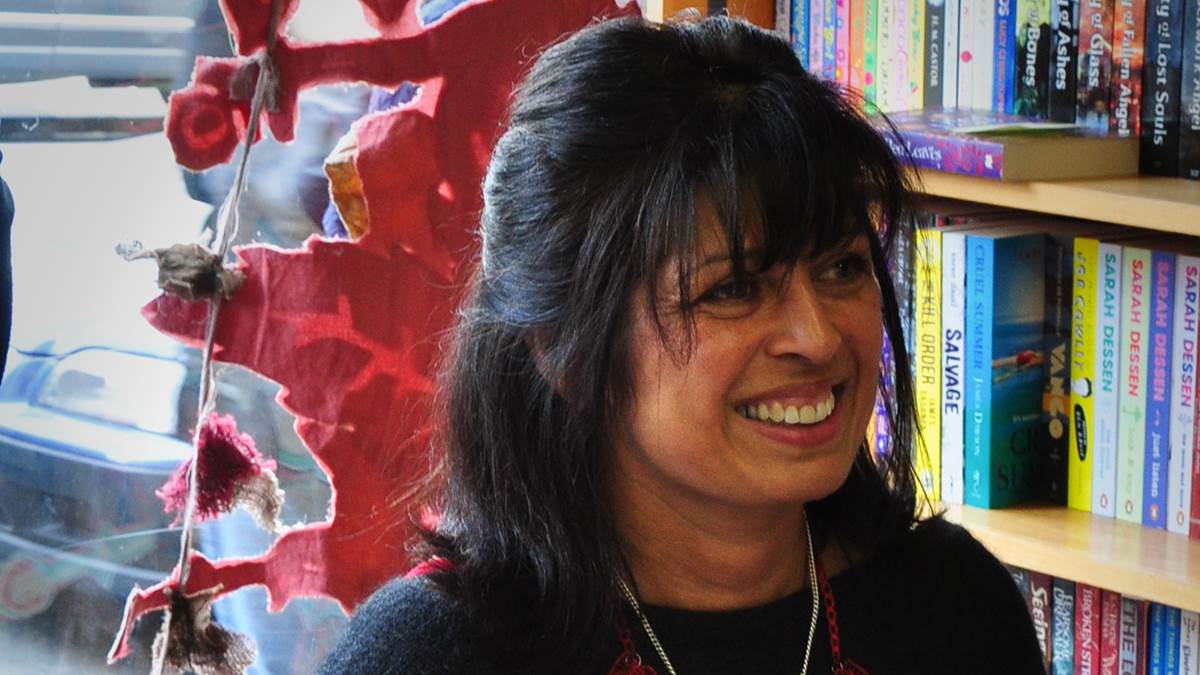
Publishing diverse stories rooted in children's contemporary lives and placing them back into their hands.
This week Cheryl Moskowitz, Poet in Residence at a London Primary School, talks to me about her year in poetry and the creation of an extraordinary collaborative anthology. 'A Life in the Year of... Poetry at Highfield' is to be published in September 2015.
Poet and novelist Cheryl Moskowitz has been Resident Poet at Highfield Primary School in North London for the whole academic year 2014-2015 and has just completed compiling an inspirational anthology, A Life in the Year of... Poetry at Highfield charting that poetic journey.
I am so looking forward to this beautiful book being made publicly available. This anthology achieves what we are all striving towards in the movement for greater diversity in children's publishing. Not only does the content of this work have the potential to speak powerfully to a wide audience, but those participating in the making of this book have a strong sense of personal ownership and belonging in the story it tells.
This is long term work in developing readers and book buyers but it's vital to ensure that the books are not only written but can find their way into every child's hands.
'The children of Highfield Primary School have found their poetic voices to talk about their lives, learning, dreams, aspirations and families by working collaboratively with Cheryl Moskowitz. Poems have been written across all subjects, by all staff and all children and the ripple effect has reached out into the community and beyond.' (From Maria Kemal's introduction to the book)
Highfield Primary School is a three form entry school in Winchmore Hill, Enfield. It is an inclusive school where linguistic and cultural diversity is valued. There are 58 different nationalities of children represented in the pupil population and 52 different languages spoken. Each child is encouraged to excel and have the skills, independence and initiative to become good citizens.
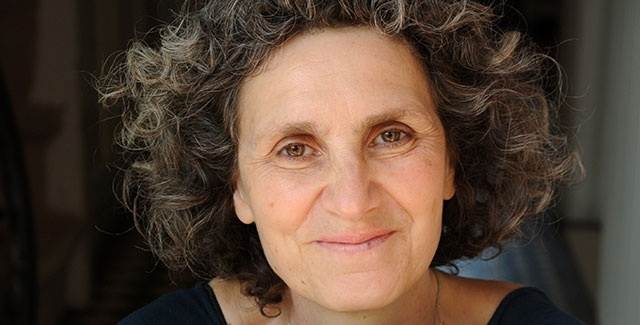
The poems in the book are by the children, and also include contributions from teachers, parents and carers and members of the wider school community. Cheryl has provided a commentary throughout the book and some of the poems in the anthology are Cheryl's, written directly in response to her own experiences at the school. Cheryl's poems sit side by side with those of teachers, students and parents at the school. A range of subjects are explored but the whole collection reflects a year of living with poetry. It makes for moving and beautiful reading. It also offers a model of publishing that illustrates the direct and powerful connection between the published work of writers, young readers, educationalists, parents and wider international and diaspora audiences.
I believe it's a work that will inspire many more young writers, readers and published writers to respond and reflect new stories in their work. It is clear to me by reading the poems in the book that while the growing (but far from new) movement in diversity in children's publishing is gathering real momentum, there is a long way to go before books for children are reflective of our diaspora identities and experience of living together.
The project was made possible by the school's own determination and the decision to direct some of their precious Pupil Premium Funds towards such an initiative.
In her Foreword to the anthology, Deputy Head Helen McGovern explains:
'As this academic year nears its end, along with our first Poet's residency we pause to think back to when it all began on a summer's day in 2014 on a staff training day. Introducing the new English curriculum and specifically the renewed focus on Poetry, the idea of finding a Poet in Residence was voiced. Through word of mouth, we found Cheryl, the journey began and the idea became a reality! We could not have imagined the impact of having a poet in residence at Highfield. Poetry has touched every curriculum area and has enhanced our children's spoken and written language. The children have embraced and developed a love of poetry that will stay with them for the rest of their lives.'
Cheryl's experience
How did you keep track of your work throughout the year?
From the start I was determined to keep a diary of everything I did and all that was happening spontaneously as a result of having a 'real live poet' in the school. From the first few minutes after the first assembly when I was introduced to the school I had children approaching me telling me about poems they had written or wanted to write. In my work with young people it has always been key to emphasise that poems get written because of something important you feel or want to say, not because someone told you to do it.
This is what I wanted to engender in the school, and it's what I do as a poet - I write because there are certain thoughts or feelings I am trying to convey or a difficult experience or new piece of learning I am trying to understand rather than because of what is required of me. Poetry is a way of saying what can't be said in conversation or other forms of writing, and there are so many complexities in the life of a child at school, particularly those newly arrived from other parts of the world, it is important to provide a space where things can be lifted away from the literal.
I began to hold a poetry surgery at lunch times where children were invited to pop in, share work and ideas and write new poems.
In a class of thirty children it is always going to be harder for each individual child to be seen, heard and understood. A poem means you can be witnessed by as many people as you choose to share that poem with - and that should be in the child's control. They can decide what is to be expressed. As poet in residence I have wanted to give permission for that to be taking place in all areas of the school.
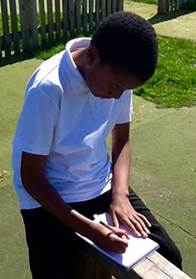 Highfield is a school that operates on three essential core values: respect, co-operation and kindness. Through their school council representatives children are invited to identify other important values to focus on in their learning. This past academic year, a year which has seen the 100 year anniversary of the start of the First World War, the 800th year anniversary of the signing of the Magna Carta and a year in which National UK Government Elections have taken place, the school council's chosen values were 'Freedom' and 'Perseverance'.
Highfield is a school that operates on three essential core values: respect, co-operation and kindness. Through their school council representatives children are invited to identify other important values to focus on in their learning. This past academic year, a year which has seen the 100 year anniversary of the start of the First World War, the 800th year anniversary of the signing of the Magna Carta and a year in which National UK Government Elections have taken place, the school council's chosen values were 'Freedom' and 'Perseverance'.
It is important to me that adults are as engaged in the process of writing poetry as the children so I have held regular after school sessions where teachers have had the opportunity to do their own writing.
I have had the absolute support, trust and respect of the senior management who settled me in with a desk, iPad, camera and welcomed me as a core member of the team. This has allowed me the freedom to initiate projects and develop work that responds directly to the demands and happenings within the school and in the children's lives.
This freedom has also meant that the expectations of whole school community have been understandably high! The best art does not result from a simple tick box approach or a straight forward commissioning. It's about exploration, exchange of ideas and opening doors that enable discovery.
Can you give examples of specific projects from which the work in the anthology has emerged?
Early on in the year in the lead up to National Poetry Day, for which the theme was 'Remember', children from the school worked together with patients from North London Hospice to write poems about treasured memories. This was an incredibly moving project and some of this work has gone into the anthology.
As a way of engaging newly arrived children in the school I set up Rainbow Rhymes, a group in for children in years 3 - 6, and their parents, with English as an additional language. The idea for the group came in my first week at the school when I had the opportunity to work with two pupils, new arrivals to the school and the country, neither of whom could yet speak English but managed to write moving poems about themselves (with the assistance of Google Translate on the school iPad!) as a way of introducing themselves to their new classmates. It seemed to me that amidst all the different languages represented in the school, poetry might well become a universal language spoken by all. Rainbow Rhymes has been a lovely group to run.
Poetry is really a love of language, all languages, a celebration of the sounds, textures and rhythms of words as well as their meaning. In Rainbow Rhymes we could share favourite words from own mother tongues. We also shared memories from the countries left behind and worked on translations and interpretations of some poems written by poets from the countries represented in the group.
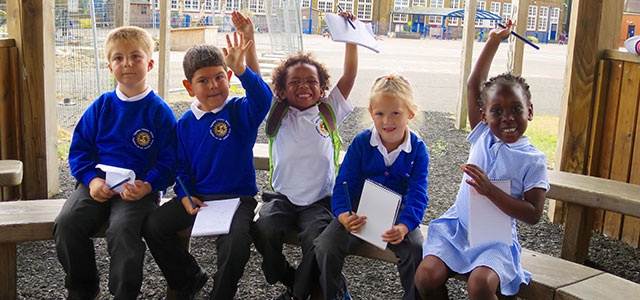
I was deeply touched by the work they produced. I was delighted to discover from the children, their parents and even their grandparents how much poetry had been a part of their lives in their own countries and to learn about the poets they loved. I discovered that one child's former teacher had been a published poet in Turkey.
Through the group I was introduced to favourite traditional Greek songs and verse, poems written in French, Spanish, Romanian and Lithuanian and discovered the moving work of Bulgarian poets Damon Damyanov and Nikola Vaptsarov, The act of translation for these children revealed a real wish to communicate something deep and meaningful from their own culture. A proper mutuality emerged, a genuine exchange, which is truly inspiring for me as author of my own work.
In addition I set up Freedom Writes, a group of six children from Year 4 who worked over a period of months to produce a sequence of poems on the theme of Freedom to use as guided reading material with children they had buddied up with in Year 2. This proved an amazing way to develop reading, writing and social skills as well as an extraordinary window in to what freedom means for children of this age with such varied backgrounds.
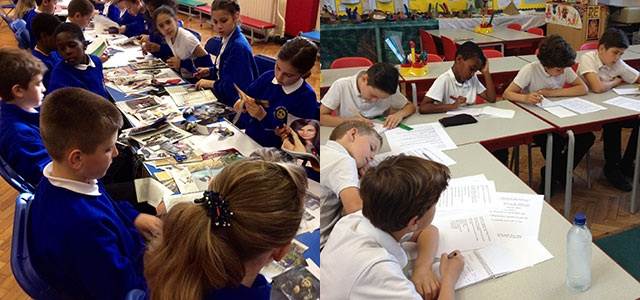
A group of children from Year 1 became my 'World Writers' and a group of particularly lively boys from Year 5 met and shared their thoughts and ideas about the problem of bullying, and adopted the group name 'Wicked Writers', producing some incredibly inspiring material which is included in the anthology.
There were other ongoing workshops; the AMA group, a group of very committed poets drawn from several different year groups who produced a number of stunning poems including some that won prizes in national competitions, the school council who wrote poetry as a way of sharing school visits and other important issues with the rest of the school.
Early on in the year I ran a 'Metaphor Masterclass' for all the children in year 6 and they produced amazing poetry on the subject of war and peace (two of the resulting poems won 1st and 2 prize in a competition jointly organised by the participatory arts charity, ReWrite and the Wiener Library for the study of Holocaust and Genocide). At the end of the summer term Year 6 wrote 'road' poems as a way of reflecting on the ups and downs, twists and turns of their school careers so far and the new journeys they are about to embark on in secondary school. The writing here is amongst the most moving and meaningful I have seen.
What are the emerging themes in the anthology?
Poetry tends to deal with the big questions; Why are we here?, Where are we going?, How can we hold on to the important things, people and places we love, what we have lost and have had to leave behind? The poems in this anthology are no exception.
There are poems about missing relatives, missing friends from school. Poems about the things we are proud of and want to share with others. There are poems that respond to world events, the recent earthquake in Nepal for instance or the Elections, what makes a good leader? There are poems that seek to deepen our understanding of what it means to be free and what it is like for those who are not, why people become bullies and what it feels like to be a victim, what is the true meaning of perseverance.
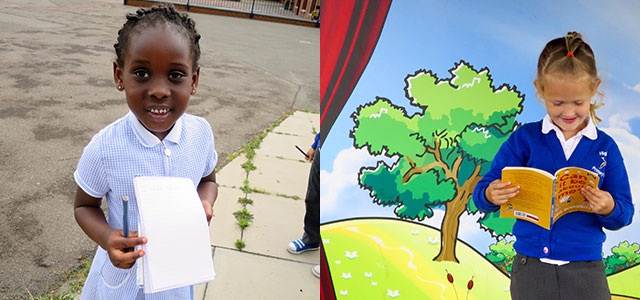
There are poems on nature and the environment. There are poems that reflect on the connections between abstract and real experiences, poems on 'computer and time' for example. I often talk to the children about the kind of things that can't be captured simply by a photograph or other ways of telling.
How has the residency fed your work?
When I wrote my first collection for children Can It Be About Me? (Frances Lincoln Books) I spent time as 'fly on the wall' in a primary school. As a writer it is wonderful to be able to inhabit the world I am writing about but I also need to have the space to reflect and respond imaginatively. This residency has allowed me to do that in abundance.
The first poem of mine in the anthology is a First Day of School poem:
Close your eyes...
Imagine a school,
a little like this one;
big schooly walls
long schooly halls
high schooly ceilings
shiny schooly floors....
Coming in at the beginning of the year, not knowing anyone or what to expect, I'm sure I was as nervous as everyone else. From the start I have wanted to write poems that were personal reflections as well as responses to school events. Writing a poem makes you think deeply about your own vision and values. When writing a poem about attendance I had to really investigate my own tendencies towards lateness, acknowledge my own regret and sadness about missing things and recognise how much support is needed to be on time. A poem should not preach but rather open up thought.
Another poem 'Tread Softly' was inspired by the declarations each child made inside their own footprint. We called these 'dream slippers' and they contained information about each individual's beliefs, knowledge, dreams and ambitions. The poem provides a way of stepping into someone else's shoes, which to my mind is a positive step towards a world without bullying.
If you stepped into my shoes
for just one moment you would be
close to understanding
what it is that makes me, me
You'd have a glimpse of who I am
instead of how I seem;
what I know... I want... believe in -
you'd even know my dreams!
I am a jet black stallion
a painted musical note
a strong but elegant lion
a book that no one wrote...
The last poem of mine in the book 'The Lesson' is a short reflection on what I have learned from being in the school.
...In every child's face
a new poem
smiles its beginning...
It was on the basis of a recommendation by the wonderful Sarah Smith, Libraries Development Manager for the London Borough of Brent, that the school first approached me to ask me to be their first ever poet in residence.
So much has happened during this residency, poetry seems to have embedded itself into the very walls and fabric of the school. I feel certain that this fluency with poetry is something the children will take with them and will continue to be a fixture long after I have gone from the school. Here are just a few lines from some of the Year 6 'road poems' written as they prepare to leave Highfield and progress towards new beginnings.
No limit to where I can go
The frost-white moon cackles
Time slows down but I will not give up (Saaqib)
A traveller
Looking back from my life
Steadily climbing (Jamari)
I dance upon the yellow road
I dance in the bright green grass
I hide in the misty shadow, a new world to look for (Pirlanta)
Will you carry on working with the school?
I have agreed to continue a relationship with Highfield Primary School in the autumn term and will stay at least until the New Year. My hope is that during that time I can spend more concentrated time with the teachers, encouraging them with their own love of writing which they will, of course, pass on to the children they teach.
The anthology will be available from September 2015, published by Circle Time Press, price £8.00.
Topics: Writer in Residence, Features






Add a comment